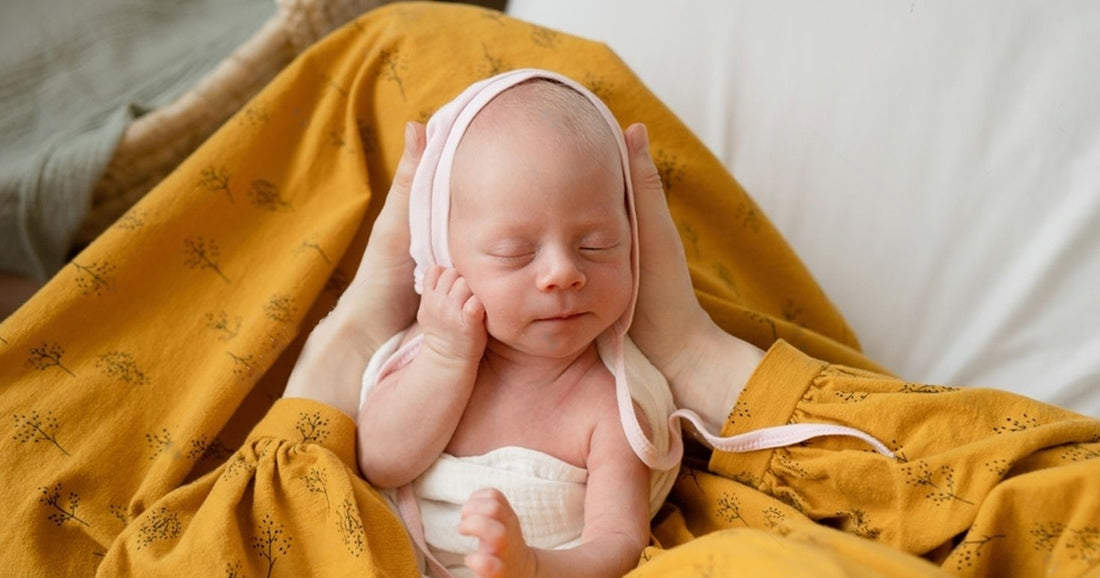
Tips for Creating a Peaceful Sleep Routine
Share

Helping your baby get a good night's sleep is crucial for their overall health, development, and well-being as parents. Sleep plays a vital role in their growth, cognitive function, and emotional well-being. However, establishing a peaceful sleep routine for your little one can be challenging, especially during the early months. In this article, we will discuss essential tips to ensure your baby gets a good night's sleep, including common habits to avoid and strategies to create a peaceful sleep routine.
Establish a consistent bedtime routine:
Formulating a consistent bedtime routine helps your baby understand that it's time to wind down and prepare for sleep. The routine should be soothing and predictable, helping your baby transition from wakefulness to sleep. Practice activities such as a warm bath, gentle massage, reading a bedtime story, or singing lullabies. Consistency is the key, it helps your baby recognize the sleep cues and prepares their body for restful sleep.

Set a suitable sleep environment:
Creating a comfortable and safe sleep environment is essential for your baby's sleep. Change the lights in the room to dim or switch on the night lights, turn the noise down, and set a comfortable temperature. Use blackout curtains or shades to block out any external light that may disrupt their sleep. Ensure proper ventilation in the room to maintain a comfortable temperature. Remove any potential hazards from the crib, such as pillows, blankets, or stuffed animals, to reduce the risk of suffocation or Sudden Infant Death Syndrome (SIDS). Find out how to avoid SIDS here.
Follow a regular sleep schedule:
Establishing a consistent sleep schedule helps regulate your baby's internal body clock and promotes better sleep. Infants thrive on routine, so aim for regular nap times and a consistent bedtime. Consider your baby's age and individual sleep needs when creating the schedule. Read our blog on Sleep techniques to find out various techniques to put your baby to sleep. While there may be variations from day to day, try to avoid drastic changes that can disrupt their sleep patterns.

Encourage daytime activities
Exposing your baby to natural light during the day helps regulate their circadian rhythm, making it easier for them to distinguish between day and night. Take them outdoors for walks or playtime, allowing them to soak up some sunlight. Engage them in stimulating activities during the day to keep them active and alert, promoting better sleep at night.
Watch for sleepy cues:
Babies have different ways of indicating sleepiness, and it's important to recognize these cues and respond promptly. Look for signs such as eye rubbing, yawning, or fussiness. When you notice these signals, put your baby to sleep while they are drowsy but still awake. This helps them learn to self-soothe and fall asleep independently, reducing dependence on external sleep aids.

Develop a soothing bedtime routine:
Incorporate soothing activities into your baby's bedtime routine to help them relax and prepare for sleep. Activities such as gentle rocking, singing lullabies, or using a white noise machine can create a calming atmosphere. Consistency is key here as well, as these familiar activities will become sleep cues for your baby, signalling that it's time to sleep.

Avoid stimulating activities close to bedtime:
In the hour leading up to bedtime, limit activities that may overstimulate your baby. This includes avoiding screen time, loud noises, or vigorous play. Kids learn by observing their surroundings. Learn good sleeping habits for yourself to set an example for your children. Opt for quieter activities that promote relaxation and winding down. Create a calm and peaceful environment, by dimming the lights and engaging in activities such as gentle play, reading, or cuddling.

Encourage self-soothing:
Teaching your baby to self-soothe is an important skill that helps them fall asleep when they wake up at night. While it's natural for babies to wake up, giving them the opportunity to settle themselves back to sleep is beneficial in the long run. Allow them a few minutes to self-soothe before intervening, but always ensure their safety and comfort.
Be responsive to your baby's needs:
While promoting independent sleep is important, it's equally crucial to be responsive to your baby's needs during the night. Attend to their hunger, discomfort, or other needs promptly, as this helps them feel secure and loved. By meeting their needs consistently, you can foster a sense of trust and security, which aids in their overall sleep routine.
Avoid sleep associations that require your presence:
Creating sleep associations that rely on your presence can make it challenging for your baby to fall asleep independently. Avoid habits such as rocking your baby to sleep or feeding them to sleep, as they may become dependent on these actions. Instead, encourage your baby to learn to self-soothe and fall asleep without external assistance.

Establishing a peaceful sleep routine for your baby requires consistency, patience, and a keen understanding of their individual needs. By following these essential tips, you can create an environment that promotes restful sleep and helps your little one develop healthy sleep habits. Remember, every baby is unique, and it may take time to find the right routine that works for them. If you have concerns about your baby's sleep patterns or need additional guidance, consult with your paediatrician for personalised advice.
